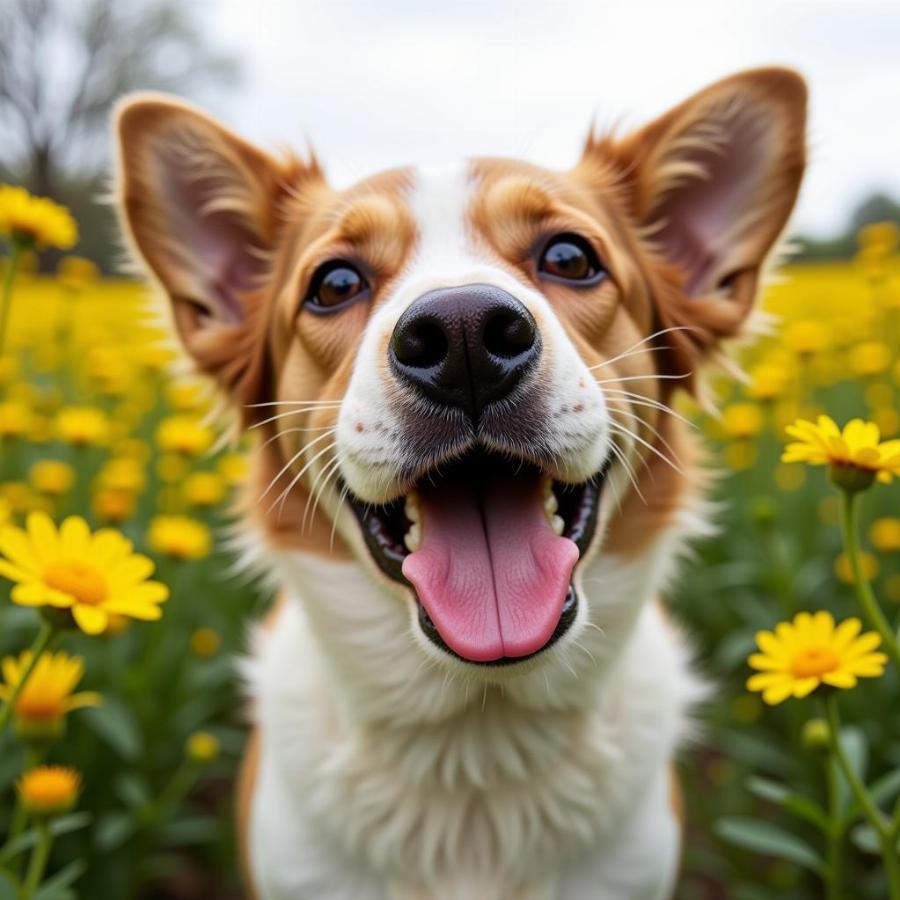If your dog has a runny nose and sneezes, you’re likely concerned. A runny nose and sneezing in dogs can be caused by various factors, from simple irritants to more serious infections. Understanding the potential causes and knowing when to seek veterinary care is crucial for ensuring your furry friend’s well-being. This article will delve into the common reasons why your dog might be experiencing these symptoms, how to distinguish between different causes, and what steps you can take to help them feel better.
Understanding the Causes of Runny Nose and Sneezing in Dogs
A runny nose, also known as nasal discharge, and sneezing are common symptoms in dogs, just like in humans. They’re often the body’s way of expelling irritants or fighting off infection. However, figuring out the underlying cause is essential for effective treatment.
Allergies in Dogs
Just like us, dogs can suffer from allergies. These allergies can be triggered by various environmental factors such as pollen, dust mites, mold spores, and even certain foods.  Chó bị dị ứng hắt hơi Allergic reactions often manifest as sneezing fits, a runny nose (often clear and watery), itchy skin, and excessive licking or chewing of paws.
Chó bị dị ứng hắt hơi Allergic reactions often manifest as sneezing fits, a runny nose (often clear and watery), itchy skin, and excessive licking or chewing of paws.
Kennel Cough and Other Respiratory Infections
Kennel cough, a highly contagious respiratory infection, is a common culprit behind runny noses and sneezing in dogs. Other respiratory infections, such as canine influenza, can also cause these symptoms. With infections, the nasal discharge may be thicker and discolored (yellow or green), and your dog might also exhibit other symptoms like coughing, lethargy, and loss of appetite.
Irritants and Foreign Bodies
Sometimes, a simple irritant like dust, smoke, or perfume can trigger sneezing and a runny nose in your dog. In other cases, a foreign object lodged in the nasal passage, such as a blade of grass or a small toy piece, can cause these symptoms. If you suspect a foreign body, it’s crucial to seek veterinary attention immediately, as attempting to remove it yourself can worsen the situation.
When Should You Worry About Your Dog’s Runny Nose and Sneezes?
While occasional sneezing and a clear runny nose might not be cause for immediate alarm, certain signs warrant a trip to the vet. dog sneezing and coughing can indicate a more serious condition. If your dog’s nasal discharge becomes thick, discolored, or has a foul odor, or if the sneezing is persistent and accompanied by other symptoms like fever, difficulty breathing, or loss of appetite, it’s crucial to consult a veterinarian.
What Can You Do to Help Your Sneezing Dog?
Depending on the cause, there are several things you can do to help alleviate your dog’s discomfort:
- For allergies: Identifying and eliminating the allergen is key. dog allergy test cost can help pinpoint the specific triggers. Your vet might recommend antihistamines or other medications to manage allergic reactions.
- For infections: Follow your veterinarian’s prescribed treatment plan, which might include antibiotics or antiviral medications. can dogs catch strep is a question some owners might have, but it’s important to remember that canine infections differ from human ones.
- For irritants: Remove the irritant from your dog’s environment. If you suspect a foreign body, do not attempt to remove it yourself. Take your dog to the vet immediately.
Frequently Asked Questions
- Why is my dog sneezing so much all of a sudden? Sudden onset of sneezing can be due to exposure to an allergen, irritant, or the start of a respiratory infection.
- Is a runny nose in dogs always a sign of something serious? Not always. A clear, watery runny nose can be due to allergies or a mild irritant. However, a thick, discolored discharge warrants veterinary attention.
- Can I give my dog human allergy medicine? Never give your dog human medication without consulting your veterinarian. Human medications can be toxic to dogs. my dog won't stop sneezing is a concern that needs professional assessment.
- How can I prevent my dog from getting kennel cough? Vaccination is the best way to prevent kennel cough. Avoid crowded dog parks or kennels, especially during outbreaks.
- What is the best nasal spray for dogs? nasal spray for dogs should only be used under veterinary guidance.
Conclusion
A runny nose and sneezing in dogs can be caused by a range of factors, from simple irritants to more serious health concerns. By paying close attention to your dog’s symptoms and seeking veterinary care when necessary, you can help ensure their well-being and provide them with the appropriate treatment. Remember, early diagnosis and intervention are crucial for managing any underlying health issues and ensuring your furry companion stays healthy and happy.
Beaut Dogs is your go-to resource for all things related to dog care, offering expert advice and guidance on how to keep your canine companion happy and healthy. For personalized support and detailed answers to your dog care questions, contact us at Email: [email protected]. We’re here to help you navigate the wonderful world of dog ownership. Beaut Dogs (https://beautdogs.com) is dedicated to providing valuable insights and practical tips to ensure your dog lives a long, fulfilling life.